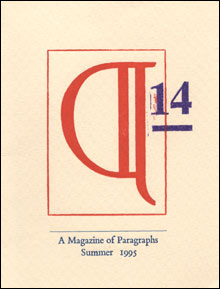
¶ |
The literary journal Paragraph was the ultimate little magazine.
Small enough to fit in a shirt pocket, Paragraph (the actual title is ¶, the typesetter’s notation for paragraph) was composed of free standing ’graphs of 200 words or less, each occupying a single page. Only 400 copies of each 38-page issue were published, and every cover was individually printed on a 1940 letterpress, an antiquated technology in which moveable type is set letter by letter.
Paragraph wasn’t splashy, and it didn’t have a huge circulation, but it was in the vanguard of the very short prose fiction genre. The magazine stopped publishing in 2005 after a 20-year run, a considerable period for an independent literary journal, many of which last only a few issues.
Poet Karen Donovan and her husband, Walker Rumble, established the magazine in 1985, when they were living in western Massachusetts and working for the now-defunct New England Monthly. “The idea,” says Rumble, a freelance writer specializing in the history of printing and books, “was to take the paragraph, and like Poetry magazine, call it that.” “There wasn’t anything out there at the time like it,” adds Donovan, who now works for a small Providence public relations firm.
The journal was born of the couple’s desire to elevate the sidebar, the short take, and the distilled observation to the realm of literature. “I felt that people were writing books that ought to be essays,” says the genial, if curmudgeonly, Rumble. The magazine was initiated with little publicity, but before long, “we experienced this swell of paragraphs,” says Donovan. Paragraph also caught the attention of Harper’s Magazine, which excerpted one of ¶’s paragraphs in 1986, as well as National Public Radio, whose Robert Siegel interviewed Rumble that same year.
Paragraph was an early exponent of what has come to be known as “flash fiction,” “micro fiction,” “sudden fiction,” or the “short short.” Such “stories” are typically 500 words or fewer, and are characterized by compressed elliptical prose. Some have a plot or clear narrative thread, but others are more impressionistic or surrealistic. In the last decade or so, there has been an explosion in the popularity of the genre, particularly in literary journals. Paragraph, whose entries were fewer than 200 words, was a vehicle for what one might call the “extreme” short, and it often blurred the distinction between poetry and prose.
The journal was part of Rumble and Donovan’s Oat City Press, which combined literary and artistic endeavor with the basic craft of printing. As such, it followed the path of Rhode Island industries, like jewelry making, which combine craft, manual labor, and ornamentation. Paragraph was also a true DIY effort in that it was not underwritten by any institution.
After 25 issues, the couple stopped publishing their journal 18 months ago, because “it was time,” says Donovan, 50. “We’d done what we wanted to do.” Rumble, 68, adds that he is now more interested in the history of printing than in the prose poetry that was coming to dominate Paragraph’s pages.
The profusion of outlets featuring the “short short” and its various permutations was another factor in Donovan and Rumble’s decision to pull the plug on Paragraph (the Web site for the journal and the couple’s Oat City Press, remains active, and some back issues are still available.) Micro fiction has become a staple of literary journals, and there are several devoted solely to it, including Salem, Massachusetts-based Quick Fiction.